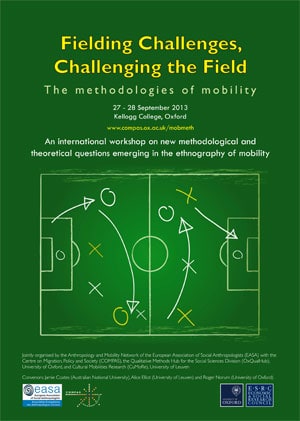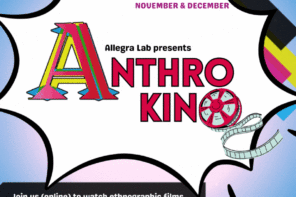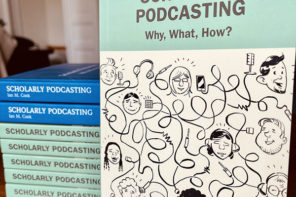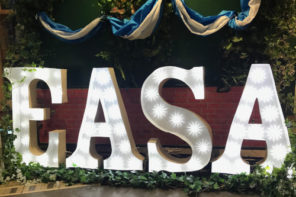27-28 September 2013
Where: University of Oxford, UK (for more info, click here)
Who: The workshop is jointly organised by the Centre on Migration, Policy and Society (COMPAS) with the Anthropology and Mobility Network of the European Association of Social Anthropologists(EASA), and The Qualitative Methods Hub for the Social Sciences Division(OxQualHub), University of Oxford, Cultural Mobilities Research (CuMoRe), University of Leuven
Co-convened by Jamie Coates (Australian National University), Alice Elliot (University of Leuven) and Roger Norum (University of Oxford).
Background
Ethnography has long been the hallmark of anthropology, and most social science disciplines now routinely employ qualitative ethnographic research methods. Primarily qualitative, and historically focused on small-scale geographic areas, this methodological focus has demonstrated its importance in understanding human social life. Necessarily malleable, the ethnographic method has adapted to shifts within the discipline, such as the emphasis on participant-observation following Malinowski, a textual and interpretive approach since feminist scholars and Geertz (among others) and the increased use of audio-visual materials by social scientists in the 1980s and 1990s, among other innovations. Anthropology’s diligently methodological foundations have demonstrated a stoic commitment to careful and holistic ethnography while broadening the ethnographic approach with new methodologies.
The methodologies in anthropological research have, however, occasionally encountered obstacles in multiple scales and geographic locations, features of modern scholarship which are being increasingly problematised by anthropologists. On the level of theory, much has been explored to this end, with differing approaches converging around the concept of mobility. Over the past several years academics have worked to develop the theoretical underpinnings of a mobility paradigm, which challenges assumptions within the social sciences such as the static, bounded concepts of culture and society as a unit of analysis, the assumed centre-periphery nature of movement of peoples from developing to developed areas of the world, and the association of mobility with freedom (and immobility with oppression).
Such challenges are decreasingly seen as novel and are becoming more and more accepted within anthropology. However, the specific (and at times unique) methodological issues raised by carrying out ethnography through the mobility lens have yet to be fully developed, theorised or spelled out. Because research into mobility comprises a wide range of area specialisations, theoretical interests and methodological approaches, exactly what constitutes the field can mean different things to different scholars in different disciplines. For some, it refers to the study of those who move, encompassing ethnographies of migrants, tourists and other mobile agents. Others employ the term mobility to emphasize the changing and dynamic nature of modern human life. Many ethnographers fall somewhere between these commitments.
Beyond the difficulties of sharing a clear picture of what we might mean when we speak of mobility, mobility researchers also face other obstacles. The mobilities we study are rapidly changing, with new technologies, materialities and political imperatives altering our fields as we study them. At the same time these changes and the growing interest in mobility-related research prompts new methodological questions in the field(s) of anthropology. Novel ethnographic spaces that comprise multiple scales, diverse geographies, extremely mobile actors and disembodied information and communication technologies (ICTs) are providing fodder for new anthropological horizons, as well as spawning new challenges and obstacles engendered by such fresh forms of scholarly enquiry. Such diversity in research approaches, problems and contexts can at times hinder the development of a coherent shared research approach among mobility researchers.









